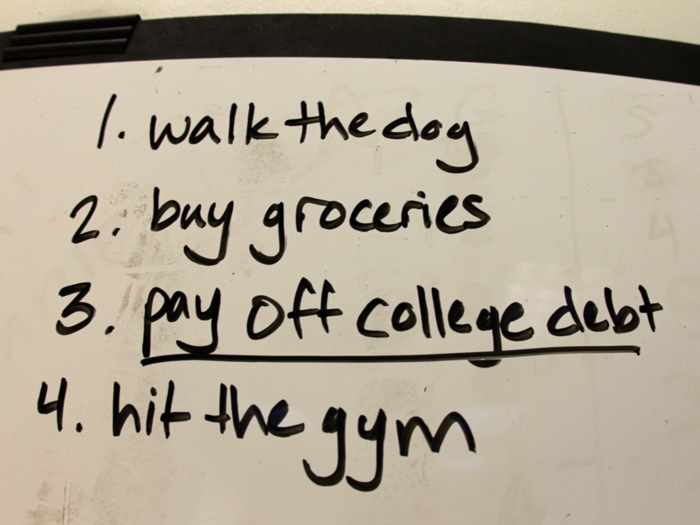26-year-old 'echo boomers' are running wild in America - here's what they're all about
How they socialize

Their health habits

The Pew report on attitudes also indicated echo boomers are, as a group, healthier than older Americans. They tend to be more physically active and give more thought to the ingredients in their food.
However, millennials also make up a sizable chunk of America's anxiety and depression cases. Many feel burdened by their debt, high costs of living, and stress from school or work.
About 2% of millennials abuse opioids. That's compared to 7.4% of baby boomers.
When they're starting families

In order to focus on their careers and compensate for their struggling net-worths and, echo boomers are starting families later than usual, Slok says. Nearly 60% of them are still single or never married.
Increasingly, millennials are getting more comfortable with having kids outside of wedlock. One Goldman Sachs report from 2015 found the most common age for new mothers was 26, while the median age for marriage was closer to 30.
In the 1970s, the median marriage age was 23.
Where they live

Housing data indicates younger echo boomers are drifting toward cities (and often co-habitating), while their older peers are moving into the suburbs — as new parents often do.
One defining trend, however, is that today's college grads are moving back into their parents' home. Trulia released a report in January that found more young people were living with at least one relative than at any point since the Great Depression.
The trend varied by region. Coastal states showed higher rates — 48.9% of people in Maryland, 52.8% in New Jersey — compared to landlocked states. In Wyoming, just 20.2% of young people lived at home.
How they work

A 2016 survey of roughly 5,000 employees by Project Time Off and the market-research firm GfK found that millennials were most likely to consider themselves "work martyrs," or people who rarely take time off from work in pursuit of career advancement.
The survey also found that millennials were most likely to demonstrate pride in their unfailing commitment to their jobs: While only 26% of Gen Xers and 20% of baby boomers wore the "work martyr" title as a badge of honor, 35% of millennials did.
What they expect from work

Millennials may not rank work ethic as a defining trait, but that doesn't mean they necessarily lack discipline.
Research has found many of them simply reject the grin-and-bear-it attitude of their elders. They expect work to be fulfilling and for their employers to treat them as individuals, not cogs in a machine.
"Companies need to understand these issues because when millennials do get hired, they might be less experienced and more frustrated than previous generations," Dan Schawbel, founder of Millennial Branding and author of "Promote Yourself," told Business Insider.
Their attitudes

Since they are highly diverse, echo boomers have largely grown up with mixed cultures and belief systems as the default, a recent Pew Research report found. They are also more likely to say technology makes life easier and brings families closer together.
Of the four generations Pew studied — millennials, Gen X, baby boomers, and the silent generation — the millennial generation was the only one "that doesn't cite 'work ethic' as one of their principal claims to distinctiveness." They do, however, say their parents' generation has a stronger work ethic.
"Millennials may be a self-confident generation, but they display little appetite for claims of moral superiority," the report states.
Financial struggles

The effect college-loan debt has had on millennials' attitudes and buying decisions can't be understated.
One recent analysis found the median amount of debt carried by 23- to 27-year-olds was roughly $14,000, and it continued to rise until people hit 40. Last year, a survey found 57% of millennials regretted taking out as many loans as they did.
These financial woes have made it harder for people in their 20s to maintain good credit and take out future loans, Slok says. "You've also seen conditions from the banks' side be relatively tighter than what they were before 2008 or 2009."
What they don't buy

Though Slok says echo boomers are moving toward starting families, many are still saddled with too much debt to even think about buying homes or cars. As a result, ownership in general has become less important to people in their 20s.
"Instead of having an ownership society, we now have a rental or leasing society," Slok says. "You still drive a car and live somewhere, but it's in a very different way relative to what your parents did."
Uber, Lyft, Airbnb, and countless other sharing-based services highlight how ingrained the anti-ownership attitude has become.
How they're buying it

In many cases, millennials aren't driving to a physical store to pay for things in-person; they're saving their credit card information in their internet browser's keychain.
Just about every age group is engaging in e-commerce, but digital-native young people are still the only group doing the majority of their shopping online.
One 2016 report found the majority of that shopping isn't even done on a computer. Some 67% of millennials use their smartphone to check prices across different retailers, and an additional 64% primarily use their phones, not PCs or tablets, to search for coupons.
What they're buying

Echo boomers are far more likely to buy items for their value, not their convenience, a recent Goldman Sachs analysis found.
They aren't as impulsive with their shopping, and are far more likely to stick to a budget for big-ticket purchases — such as saving up for a pricey pair of durable boots over buying a cheaper pair every winter.
They also tend to favor buying experiences over material goods. Instead of collecting things that can gather dust, the group largely prefers to collect memories or stories.
Popular Right Now
Advertisement